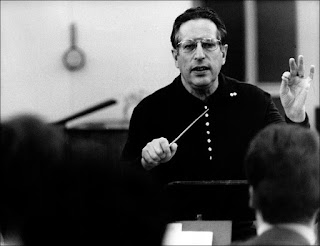Information
Composer: Dmitri Shostakovich
- Symphony No. 5 in D minor, Op. 47: I. Moderato - Allegro non troppo
- Symphony No. 5 in D minor, Op. 47: II. Allegretto
- Symphony No. 5 in D minor, Op. 47: III. Largo
- Symphony No. 5 in D minor, Op. 47: IV. Allegro non troppo
Berlin Symphony Orchestra
Kurt Sanderling, conductor
Date: 1984
Label: Berlin Classics
--------------------------------------------------------------------
Review
Kurt Sanderling's epic interpretation of the Fifth should appeal to those who responded positively to his Eighth (also on Berlin Classics—see above). Recorded in East Berlin in 1982, it is again overwhelmingly 'pessimistic' in tone, while the recorded sound (analogue) is rather more refined. As before, the conductor sets out his ideas about the work, ''one of the towering masterpieces of the 20th century'', in an accompanying interview. ''In the performances which I have directed I tried to avoid misunderstandings, driving home the message that the finale was not a rousing tribute to a party congress.'' Despite the warning, I was not quite prepared for the bleak immobility of Sanderling's closing pages. The movement sets out at quite a lick and its pacing is otherwise relatively traditional. This is post-Testimony Shostakovich with a vengeance. The first movement, though scarcely ardent in the Bernstein manner, so that passages like the start of the development seem strangely literal, is always carefully calculated. The baldness never turns into drabness. Perhaps the Berlin SO cannot match the glorious sonority of the Concertgebouw strings for Haitink, but with Sanderling the serene second subject never becomes a perfunctory trudge even when its return highlights deficiencies in the Berlin horn department. There is a potent sense of desolation as the music winds down.
I was less convinced by the Allegretto, deliberately prosaic in a Teutonic sort of way. In the notes, Sanderling refers to this music as ''a grim and biting parody'', yet in his anxiety to avoid any hint of boisterousness he comes close to mere heaviness. The Largo is deeply felt, albeit curiously un-Slav in feeling. It's not simply a matter of pace—even in the 1960s Previn was taking it slower than this (RCA, 5/66—nla)—but rather of manner. Sanderling's glacial stoicism is easy to respect, harder to love. Nevertheless, if such uncompromising rigour strikes any sort of chord, don't hesitate. Sanderling fled Nazi Germany for Stalin's Utopia in 1936: as he sees it the issues are too grave for easy point-making. This is music with the emotional power to weld an audience together, sweeping aside all intellectual reservations and needing no embellishment from him. Regrettably, Berlin Classics provide no coupling.
-- Gramophone
More reviews:
http://www.arkivmusic.com/albumpage/150434-E675-5
http://www.amazon.com/Shostakovich-Symphony-No-5/dp/B0000035OM
--------------------------------------------------------------------
Dmitri Shostakovich (25 September 1906 – 9 August 1975) was a Russian composer and pianist, and a prominent figure of 20th-century music. Shostakovich achieved fame in the Soviet Union, but later had a complex and difficult relationship with the government. Shostakovich's music is characterized by sharp contrasts, elements of the grotesque, and ambivalent tonality; the composer was also heavily influenced by the neo-classical style pioneered by Igor Stravinsky, and (especially in his symphonies) by the post-Romanticism associated with Gustav Mahler.
http://en.wikipedia.org/wiki/Dmitri_Shostakovich
http://en.wikipedia.org/wiki/Dmitri_Shostakovich
***
Kurt Sanderling (19 September 1912 – 17 September 2011) was a German Jewish conductor. He fled the Nazi in 1936, left for Soviet Union. From 1942 to 1960, he was joint principal conductor with Yevgeny Mravinsky of the Leningrad Philharmonic. He was also a close friend of Dmitri Shostakovich. He returned to East Germany where he led the Berlin Symphony Orchestra and Dresden Staatskapelle. He made his British debut in 1970 and later became particularly associated with the Philharmonia Orchestra. Sanderling announced his retirement from conducting in 2002. His three sons are also conductors.
--------------------------------------------------------------------
FLAC, tracks
Links in comment
Enjoy!




This comment has been removed by the author.
ReplyDeleteCopy Adfly (adf.ly/XXXXXX) or Shortest link (shorte.st/XXXXX or viid.me/XXXXXX) to your browser's address bar, wait 5 seconds, then click on 'Skip [This] Ad' (yellow button, top right).
ReplyDeleteIf Adfly or Shortest ask you to download anything, IGNORE them, only download from file hosting site (mega.nz).
If MEGA says 'Bandwidth Limit Exceeded', try to register a free account.
MEGA
http://adf.ly/1Jai0V
booklet
https://mega.nz/#!w8olgbZZ!90LzvcQLKDoqqOKFDUSzYpDI6VniAQ7AVF8a-Oh0-xc